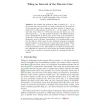10 search results - page 2 / 2 » A Combinatorial Proof of the Sum of q-Cubes |
136
click to vote
FOCS
2006
IEEE
15 years 8 months ago
2006
IEEE
Spin systems are a general way to describe local interactions between nodes in a graph. In statistical mechanics, spin systems are often used as a model for physical systems. In c...
CPM
2006
Springer
15 years 5 months ago
2006
Springer
We consider the problem of tiling a segment {0, . . . , n} of the discrete line. More precisely, we ought to characterize the structure of the patterns that tile a segment and thei...
111
click to vote
APPROX
2010
Springer
15 years 3 months ago
2010
Springer
We give a simple combinatorial proof of the Chernoff-Hoeffding concentration bound [Che52, Hoe63], which says that the sum of independent {0, 1}-valued random variables is highly ...
100
click to vote
DCG
2010
15 years 2 months ago
2010
We express the matroid polytope PM of a matroid M as a signed Minkowski sum of simplices, and obtain a formula for the volume of PM . This gives a combinatorial expression for the...
104
click to vote
JCT
2007
15 years 1 months ago
2007
Given a sequence of integers b = (b0,b1,b2,...) one gives a Dyck path P of length 2n the weight wt(P) = bh1 bh2 ···bhn , where hi is the height of the ith ascent of P. The corr...

